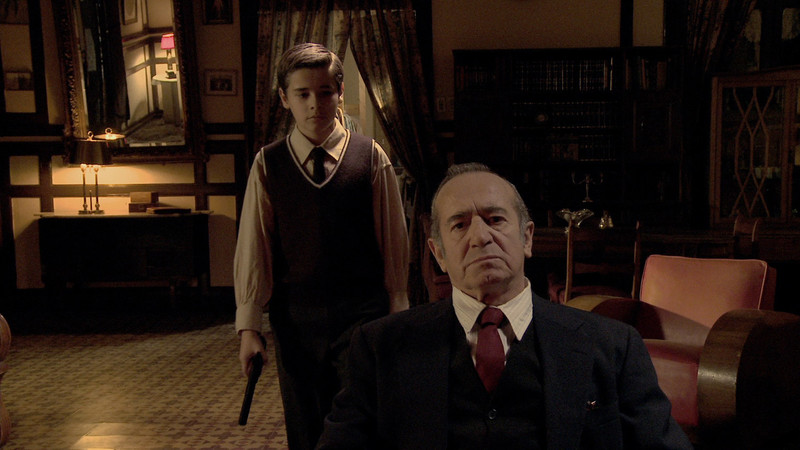





This year’s VIENNALE retrospective is dedicated to the Chilean director, writer and poet Raúl Ernesto Ruiz Pino.
Ruiz – who was born in Chile in 1941 – was exiled after Pinochet’s coup d’etat in 1973 to France where he emerged as one of the most exciting and innovative filmmakers of the 1960s. During a prodigious career that would continue well into the 21st century – his final films were completed by his wife and collaborator Valeria Sarmiento – he explored a range of different styles, places and cultures and directed over a hundred films, embracing the big screen and television as well as experimental fare.
Raúl Ruiz was certainly a maverick and soon abandoned his university studies in theology and law and switched to film school in Argentina in 1964 where he would stand out from the crowd of politically-engaged Chilean filmmakers such as Patricio Guzman with work that was more surreal and avant-garde in nature. Success came early and his first feature Three Sad Tigers (1968) shared the Golden Leopard at the 1969 Locarno Film Festival.
During the 1970s and 1980s Ruiz developed an ironic and often amusingly eccentric style of low-budget filmmaking supported by his producer Paulo Branco. A long collaboration with Chilean composer Jorge Arriagada kicked off with Colloque de chiens (1977). This was followed by The Suspended Vocation (1978); The Hypothesis of the Stolen Painting (1978); On Top of the Whale (1982); Three Crowns of the Sailor (1983); City of Pirates (1983); Manoel’s Destinies (1985); Treasure Island (1985) and Life is a Dream (1986).
Ruiz’ idiosyncratic style gained traction and consequently higher budgets during the 1990s attracting well-known international stars to the party and top talent such as John Hurt (Dark at Noon,1992) who bought into Ruiz’ eclectic style of filmmaking. With the band-waggon rolling his films were soon in demand on the international festival circuit.
A coup came in 1997 when Catherine Deneuve and Melville Poupaud starrer Genealogies of a Crime won the Silver Bear at Berlinale for Outstanding Artistic Achievement. And Deneuve was joined by her daughter Chiara Mastroianni, Emmanuelle Beart and John Malkovich for the glossy Palme d’Or nominated Time Regained again in 1999. Succeed breeds success and Ruiz went on to cast Isabelle Huppert in his 2000 drama Comedy of Innocence. Nominated for the Golden Lion at Venice the film went home empty-handed (the top prize instead being awarded to Jafar Panahi”s The Circle). Another, unsuccessful, attempt at winning the Palme d’Or came for Ruiz in 2003 with That Day.
Ruiz also made mainstream films in the English language with Shattered Image (1998) and A Closed Book (2010), but his final international flourish was Mysteries of Lisbon, a ravishing four and a half hour epic based on the novel by Camilo Castelo Branco.
Very much an intellectual filmmaker Ruiz plundered the literary world for ideas and expounded his theories in two books Poetics of Cinema 1: Miscellanies (1995) and Poetics of Cinema 2 (2007). He engaged with film and video projects in universities all over the world until his death in 2011, from cancer complications. His final resting place was his homeland of Chile where a National Day of Mourning was declared in his honour.
Determined that all films would reach international audiences, Valeria Sarmiento, also a director, presented his 2012 feature Night Across the Street which made a fitting conclusion to Ruiz’ long and impressive career at the Directors’ Fortnight at Cannes Film Festival.
Lines of Wellington (2012), the Napoleonic epic that Ruiz was working on when he died, premiered on the international circuit throughout the rest of the year, at Venice, San San Sebastián, Toronto and New York Film Festival. And Locarno Film Festival 2017, his half-finished feature The Wandering Soap Opera, made for an amusing entry, its telenovelsa-esque style very much in keeping with the mainstream TV fare of his homeland of Chile, where he had began the project in 1990. Perhaps the highlight of this retro is his film El Realismo Socialista Come Una De Las Bellas Artes (1973/2023), which for a long time was only available in fragmentary form and has now finally been completed. MT
VIENNALE INTERNATIONAL FILM FESTIVAL 2023 | 19 – 31 OCTOBER 2023